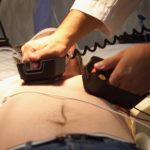 Numerous studies continue to emerge in support of the link between depression and heart attack. In fact, the two play a viscous cycle with each other, meaning one results in the other and vice versa.
Numerous studies continue to emerge in support of the link between depression and heart attack. In fact, the two play a viscous cycle with each other, meaning one results in the other and vice versa.
Roughly one in 10 Americans suffer from depression – 22 million individuals. Furthermore, depression is twice as likely to occur if you’ve experienced a heart attack. In those with lifelong depression the rate of experiencing a heart attack is 30 percent, compared to 15 percent for those who do not have depression. Even individuals undergoing treating for their depression are still at a higher rate to experience a heart attack. Their risk is 17 percent, in comparison to eight percent for those without depression.
Advertisement
As you can see, depression and heart attack seem to go hand-in-hand, so it’s important to maintain a healthy mind and heart.
Study: Depression raises risk of heart disease
 Depression alone can bring with it many health consequences – a lower pain tolerance, low mood and poor sleep, just to name a few. Much research supports the link between depression and the increased risk of heart attack and stroke.
Depression alone can bring with it many health consequences – a lower pain tolerance, low mood and poor sleep, just to name a few. Much research supports the link between depression and the increased risk of heart attack and stroke.
The latest research not only outlined that depression increases the risk of stroke, but even after depression is treated and a person is in remission they still have a higher risk of experiencing stroke later on. The findings suggest that depression should be treated as soon as possible to decrease a person’s likelihood of experiencing an initial stroke. It is believed that depression causes damage to the brain, which raises the risk of stroke.
One report from the European Society of Cardiology’s annual meeting revealed that individuals with depression and cardiovascular disease are at risk for death up to five times more when compared to someone with just cardiovascular disease alone. One theory for the link is that with depression you are less likely take care of your health and often embark on unhealthy lifestyle habits, which can worsen cardiovascular disease.
Lastly, researchers at Columbia University Medical Center for Behavioral Cardiovascular Health in New York assessed 4,487 patients who had been diagnosed with coronary heart disease. Participants completed surveys which gauged their stress levels along with depression. Their findings revealed that high levels of stress and strong depressive symptoms increased their risk of heart attack by 48 percent.
All the discussed research clearly points to the detrimental effects of depression and heart attack, thus making it so important to maintain overall health – mind and body included.
Role of depression in patients with cardiovascular disease
 There is a high risk associated with those who have coronary heart disease or those who have undergone coronary artery bypass graft. Numerous studies have shown high mental stress can contribute to poor heart health. It has been shown that unmanaged stress contributes to high blood pressure, a weakened immune system and irregular heartbeats.
There is a high risk associated with those who have coronary heart disease or those who have undergone coronary artery bypass graft. Numerous studies have shown high mental stress can contribute to poor heart health. It has been shown that unmanaged stress contributes to high blood pressure, a weakened immune system and irregular heartbeats.
For individuals already diagnosed with coronary heart disease depression can further increase their risk of cardiovascular events, including heart attack. Even when recovering from heart surgery depression can lower a person’s tolerance to pain, intensifying it along with a desire to withdraw from others.
Additionally, there are many negative lifestyle habits associated with depression, which further contribute to a poor heart. Smoking, drinking alcohol, social withdrawal, lack of physical activity and a poor diet are more likely in those who are depressed and are all contributing factors of a sick heart. Depression by itself has known to be a risk factor for cardiovascular disease as well.
Depression can even hinder a person’s ability to recover from a cardiovascular event. They may not be inclined to follow their doctor’s orders, take medications and embark on healthy lifestyle habits known to boost cardiovascular health. So, as you can see, depression can affect all aspects of cardiovascular disease and have many negative effects on the heart.
How to stay heart healthy even when feeling down – 3 key steps to overcome depression
If you’re depressed, or even overly stressed, the furthest thing from your mind will be your heart health, but it should still remain your number-one priority. By following these three key steps you can better overcome your stress and anxiety and work to keep your heart healthy.
 1. Identify the cause of your stress or anxiety and address it. Don’t be afraid to seek out therapy in order to uncover coping mechanisms or receive expert advice.
1. Identify the cause of your stress or anxiety and address it. Don’t be afraid to seek out therapy in order to uncover coping mechanisms or receive expert advice.
- 2. Choose healthy habits, and don’t rush it. You won’t become a health expert overnight, but baby steps can help you slowly work your way up to exercising more and eating better. Set goals and try to achieve them, for example, start with a goal of walking for 10 minutes a day and then increase the duration on a weekly basis.
- 3. Incorporate other healthy lifestyle habits one at a time instead of trying to “fix” everything at once. Just like how you have to gradually build yourself up to be healthy, you need to gradually come down from being unhealthy. If you smoke, make quitting a single goal, and don’t move on to your next goal until that one has been completed.
Treating depression after a heart attack
Advertisement
If left untreated depression can continue to impair your health by raising your risk of premature death. Seeking out professional advice through therapy and counseling is a good stepping stone to overcome your depression, especially if you cannot pinpoint its cause. Therapists can use different techniques to better guide you in the right direction and offer coping mechanisms to deter relapse.
Additionally, it’s equally important to take up exercise. Exercising can have many mood-boosting benefits, so an easy way to start feeling uplifted is with daily exercise.
Just remember, the sooner you treat your depression, the quicker you can begin to improve your long-term health and minimize complications.
